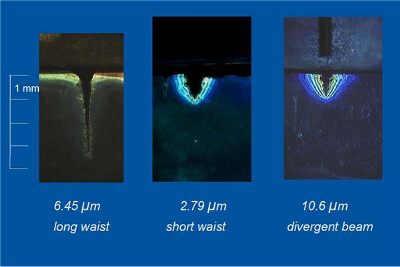Max Born Institute for Nonlinear Optics and Short Pulse Spectroscopy (MBI) research team developed a table-top solid-state laser system that can precisely cut the brain tissue. This development is a part of the EU project with partners from seven European countries.
 Tissue ablation with the novel all-solid-state light source at 6.45 microns based on frequency conversion in comparison with two clinical lasers, a 2.79 micron Erbium solid-state laser and a 10.6 micron carbon dioxide gas laser. (courtesy of UMC)
Tissue ablation with the novel all-solid-state light source at 6.45 microns based on frequency conversion in comparison with two clinical lasers, a 2.79 micron Erbium solid-state laser and a 10.6 micron carbon dioxide gas laser. (courtesy of UMC)
Scientists from the Vanderbilt University (Nashville, TN) performed an experiment in 1999 that involved the removal of a brain tumor using free-electron laser at a wavelength of 6.45 µ. This wavelength in the mid-infrared spectral region is ideal for surgical operations. In this method, the free-electron lasers are large and cannot be used frequently in accelerator-based facilities. Any arbitrary wavelength can be opted. In contrast, solid-state or gas lasers generate well defined wavelength based on the active medium being used. At present, laser wavelengths of about 2, 2.8 and 10.6 µ are being used.
The new laser produces 6.45 µ of short pulses representing a repetition rate of 100-200 Hz, thereby achieving targeted average power of more than 1 W. Owing to the resonant laser heating of non-aqueous components like proteins as well as absorption of water, there is minimal collateral damage at this wavelength. The penetration depth is of several microns at this wavelength, analogous to the cell size, and almost reaches the optimum value.
The 2008-launched EU-funded project, MIRSURG focuses on patching-up diode-pumped solid-state lasers in 6.45 µ mid-infrared spectral range. During spring 2012, MIRSURG final meeting was conducted in Saint-Louis, France, wherein the project team demonstrated a compact all-solid-state prototype that can fit on table-top. Frequency conversion contributed to the desired optical wavelength of 6.45 µ. Having a wavelength near 2 µ, the laser beam was converted to the mid-infrared by using nonlinear optical crystals.
The researchers made an effort to integrate the desired wavelength with high single pulse energy of over 5 mJ, good focusing capability as well as short pulse duration of about 30 ns. The long term stability, repetition rate, and reliability of the entire laser system led to successful practical surgical applications.
Partner members of MIRSURG will further optimize the new table-top laser, followed by analyzing its tissue ablation capabilities while demonstrating real solid-state laser surgery at 6.45 µ.